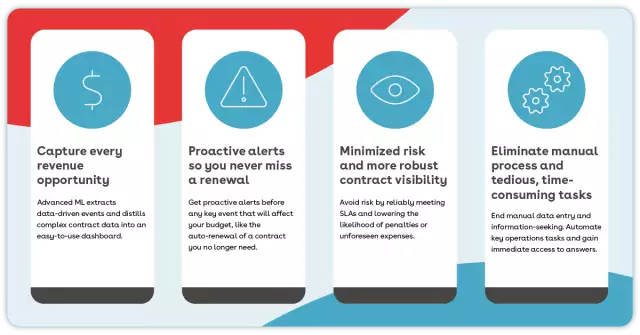
Contract AI: Definition, Benefits & How To Use It in 2024

Signing on the dotted line isn’t the final phase of a contract’s life cycle. Every contract as it approaches its end date may be amended, renewed, terminated, or let to expire. And companies can’t afford ineffective contract lifecycle management.
For many organizations, keeping track of where a contract is in the cycle, what information needs to be included, and when, is not only overwhelming, but also time-consuming. On top of that the lack of transparency and visibility turns would-be simple decision making into a frantic race against time to (hopefully) avoid letting a valuable contract lapse or otherwise missing out on incremental revenue opportunities.
In response to chaotic and burdensome contract management activities, digital-first organizations are now turning to contract automation through machine learning and artificial intelligence to simplify contract operations, accelerate review and revenue cycles, and help organizations maximize the value of every contract.
What is contract AI?
Business performance can be positively impacted if current, accurate, and relevant contract information is in responsible decision-makers hands. The challenge for many organizations can be accessing that data. Furthermore, the data may be spread across several files or buried in thousands of legal agreements.
Contract AI (artificial intelligence) utilizes tools for contract ingestion and analysis. It leverages the most advanced machine learning (ML) with attorney verification to identify, extract, transform, and validate content from contracts protecting stakeholders from legal issues and contract breach risks. Contracts that previously lived outside your CLM can easily upload into the CLM system to run analysis and manage contracts in a searchable, central repository.
The benefits of contract AI
The contract process and lifecycle are now being digitized. This shift to digital-first is not only helping teams quickly filter, sort, review, and approve contracts, but it is enabling them to set up pre-defined terminology and clause libraries, making contract creation and review quicker and simpler.
Legal digital transformation is enabling businesses to move away from administrative contract management tasks and to focus, instead, on strategic, needle-moving initiatives for the organization.
What’s more, contract AI is also helping organizations and leadership realize the full value of every contract by extracting unstructured text from commercial agreements and organizing it into structured data. This allows for full visibility into contracts so the business can confidently track obligations, manage opportunities, and mitigate risks.
Here are a few major benefits of investing in contract AI:

- Proactive alerts so you never miss a renewal or revenue opportunity
Individuals are tasked with keeping track of key events in the contract’s lifecycle--like contract autorenewals—and other date-driven events.
With contract AI, it is easier to stay on top of contracts by setting up automated alerts and notifications. These alerts can be sent before every date-driven event and allow insights to be collected that help with renegotiating contract terms before a renewal. What’s more, risk reports highlight potential liability exposure and questionable clauses that are present in contracts or within a clause library.
- Minimized risk and more robust contract visibility
One of the most important contract related tasks is signing off on good deals and mitigating risk for the company. When there’s a lack of visibility into every contract, during every stage of the contract lifecycle, exposure to liability and risk increases.
With contract automation and AI, businesses can ensure they are signing off on good deals, avoiding risks, and has full visibility into all contract obligations.
With Conga Contract Intelligence, you can confidently track obligations, manage opportunities, and mitigate risks.
- Eliminate manual process and tedious, time-consuming tasks
Manual tasks are taking the focus away from strategic, needle-moving business initiatives. Contract managers are often tasked with finding, sorting, extracting, and updating contract information and data post-signature, manually.
With contract AI, manual tasks that were managed by redlining, approvals, reviewing contracts, and more, are now a thing of the past, freeing up time to focus on the bigger picture. The slow, costly process of manual data entry and information seeking is solved with contract AI because these tasks are automated. This automation now easily provides contract managers with the information they need in seconds instead of hours or even days.
How to use AI for contract management
Utilizing AI for contract management entails a strategic integration of advanced technology into existing workflows. Begin by identifying the specific pain points within your contract lifecycle where AI could offer significant value, such as contract review, analysis, or compliance tracking. Research and select AI-powered contract management tools that align with your organization's needs and seamlessly integrate with your existing systems. These tools often leverage machine learning and NLP to extract, organize, and analyze contract data, enabling faster and more accurate contract reviews and assessments.
Once you've chosen an AI-driven contract management solution, define clear templates, workflows, and key performance indicators (KPIs) tailored to your business objectives. Train your team to effectively utilize the AI-powered tools, emphasizing how these technologies enhance their roles and streamline contract-related tasks. Establish protocols for AI-assisted decision-making, emphasizing the collaborative relationship between AI-driven insights and human expertise. Regularly evaluate the AI's performance, refining processes based on feedback and evolving business needs. Through deliberate integration and strategic utilization, AI becomes a powerful asset in optimizing contract management processes, fostering efficiency, accuracy, and informed decision-making.
How contract AI is changing the game
The world of operations in the revenue process has changed rapidly in the past few years. Here are a few top trends in contract management and contract AI that will change the game:
Contract AI and contract lifecycle management tools will continue to gain popularity
Contract lifecycle management (CLM) technology has become a staple of modern corporate business practice and is projected to grow on average 11% per year through 2030 more businesses begin to adopt CLM platforms.
The automated workflows and processes alleviate much of the manual data entry and paperwork previously dealt with. But in an era where time is money and when individuals are tasked with taking on a more strategic role in the businesses, simple automation won’t be enough as we approach.
Contract AI is a next-generation approach to CLM that empowers sales, procurement, legal, and other teams across the organization to gain full visibility into past and present contracts to track obligations, mitigate risk, and maximize the value potential of contracts.
These solutions use AI and machine learning to extract unstructured text from commercial agreements and organize that information into the contract, so the data is structured and easier to analyze and manage.
This automated and streamlined process allows individuals to populate the right data, in the right contract which in turn eliminates the need for manual entry and multiple rounds of reviews and revisions.
Automated document management and generation software will help you save time with contract creation
With the quick shift to remote and hybrid working environments due to the COVID-19 pandemic, organizations have had to figure out how to support remote contract management creation, management.
A critical activity in the contract process—mitigating risk and ensuring language is accurate--is not only extremely time-consuming, but it can be a huge headache for contract managers as clauses, terms, and conditions can vary depending on multiple different factors including region, engagement, and more.
What’s more, sales teams, under pressure to hit revenue targets, might include incentive language in a contract to help close a deal faster but might not comply with corporate policies or industry standards. And when the contract reaches review, the sales rep and their prospect will certainly be disappointed when any rogue clauses or promises to get nixed.
Intelligent CLM solutions eliminate virtually all of this complexity, friction, and risk by automating contract drafting activities and populating each contract with pre-approved language. AI-powered contract solutions use a range of contract templates and generation wizards to enable sales, procurement, legal, and other teams to generate new documents—contracts, quotes, and more—with just a few clicks.
With the introduction of clause libraries, there is more control over contract language without having to be directly involved in every step of the contract negotiation. Plus, all these activities can be done in one centralized system, allowing for greater visibility for all teams involved.
A centralized and smart contract repository
Organizations that have cycled through different contract software—from simple, consumer-grade contract templates to robust, enterprise CLM solutions—frequently have legacy contracts saved as scanned PDFs in some type of digital document repository that still requires a level of manual organization and categorization.
Legal and sales teams have only a hazy understanding at any given time of the many and varying contracts and obligations that exist in their environment.
Artificial intelligence empowers teams to make more informed decisions about
- Contract renewal pipeline
- Up-sell or cross-selling opportunities
- Existing and upcoming obligations
- Accounts with termination clauses
Contract AI and machine learning can help overcome these challenges by centralizing contracts into a single solution where AI can help categorize the documents for easier reference and management.
The repository becomes the company’s single source of truth, replacing disparate storage systems that demand complex and time-consuming manual contract management tasks with intelligently automated ones and enabling more robust and accurate search queries.
Legal operations role in the contract lifecycle will continue to be critical
With the introduction of new, innovative technology aimed to reduce manual, administrative, and tedious work for contract managers, there will likely be shift in existing roles. However, legal operations are actually critical to digital transformation initiatives and business strategy more now than ever before.
Operations will be tasked with managing these digital solutions and ensuring that even with the robust automation, that contracts are still doing their job—protecting the company and mitigating risk--all while having the right clauses, terms, and conditions included for the deal.
Additionally, with the introduction of these solutions, businesses can help define how the software can be used cross-functionally which will empower departments from all over the organization to work more closely and collaboratively.
With the implementation of software that centralizes all contract activities and is fitted with automation, more time can be spent on strategic, needle-moving projects that will bring the organization into the future.
Can AI Write Legal Contracts?
AI's role in legal contract drafting is poised for expansion. The technology continually evolves, improving its ability to understand legal nuances, analyze complex clauses, and generate accurate contracts efficiently.
However, while AI demonstrates remarkable potential, it's crucial to acknowledge its current limitations. AI-generated contracts often require human review to ensure legal compliance and address specific nuances that automated systems might overlook.
In summary, AI's capability to write legal contracts is steadily advancing, backed by significant investments, the emergence of AI-driven legal tools, and compelling case studies demonstrating increased efficiency in contract drafting. As AI continues to refine its capabilities, it stands poised to revolutionize the legal landscape by enhancing productivity and accuracy in contract creation.
Are you prepared to embrace Contract AI?
Contract AI represents a solution that empowers businesses to accomplish more work in less time while safeguarding the organization and its customers.
The primary goal of CLM and Contract AI software solutions is to alleviate individuals from time-consuming, low-value, and repetitive tasks.
As organizations continue their digital transformation efforts, effective technology solutions are essential to automate repetitive and tedious day-to-day tasks. This shift allows teams to focus on higher-value, strategic initiatives that boost efficiency, competitiveness, compliance, and profitability.
Are you prepared to embrace contract AI?
Contract AI is an augmentation solution that empowers businesses to accomplish more work, in less time, while still protecting the organization and its customers.
The ultimate goal of CLM and contract AI software solutions is to unburden individuals of time-consuming, low-value, and repetitive tasks.
As organizations continue to embrace digital transformation efforts, they’ll need technology solutions to effectively automate repetitive and tedious day-to-day tasks so they can train their focus on higher-value, more strategic initiatives that help the company be more efficient, competitive, compliant, and profitable.
Learn more about how contract AI is changing the game in our latest blog.



